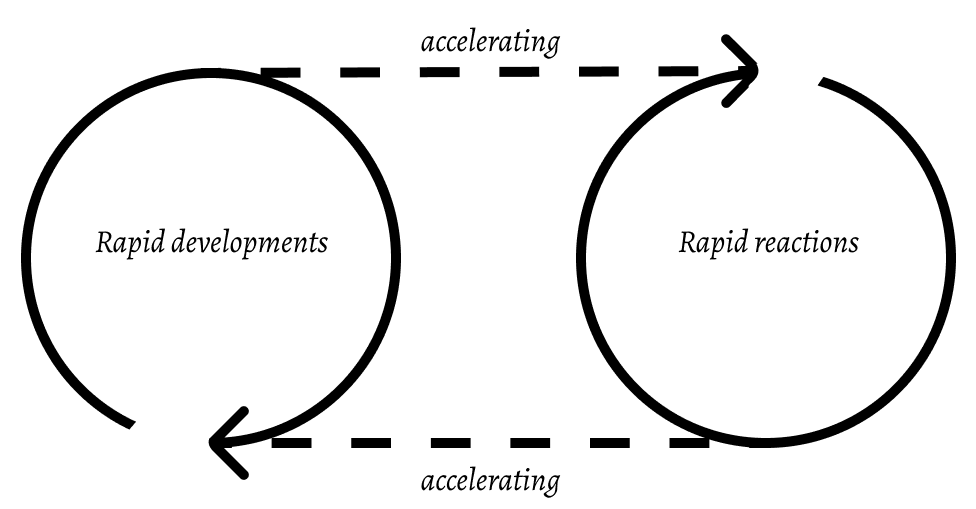That’s Chuck Yeager in front of the Bell X-1, the first aircraft to break the sound barrier back in 1947.
When future historians (if we still have those) look back at the 2020s, they’ll recognize this as the era we broke the attention barrier.
Imagine someone who really cares about a subject and devotes their whole attention to it. When that person can no longer keep track of the latest developments in that subject, we’ve broken the attention barrier.
Historians will bicker (if that’s something historians still do) over the exact moment this happened – it could be covid, the war in Ukraine, or GPTx. All events share the same fundamental properties that led to the breakthrough:
Development/Reaction feedback loop. The “reaction economy” has existed for many years now. That’s most nakedly on display in sports, where talking heads manage to squeeze many hours of entertainment out of minor developments – trade rumors, MVP races, body language analysis, etc. Recently, the reaction economy has matured to the point that it actually influences the developments themselves. Most top athletes now have one foot in sports and one foot in media, seeking to “control the narrative” and making business decisions that serve their interests in both realms.
The sports world still turns slower than the speed of attention – the same can’t be said for covid, the conflict in Ukraine, or GPTx. In each, media attention has had a direct impact on the events themselves, to the point that the two realms merged and the media landscape arguably became the most strategic front for the parties involved.
High costs of finding relevant information. The media landscape thereby becomes both polluted with noise and impossible to ignore. If you are an AI researcher, or a war journalist, or the head of the CDC, there’s no such thing as “keeping your head down” anymore. Important information is simultaneously everywhere and very difficult to find. It’s not clear what it means to focus in this new world.
Collapse of relevance. When even the most committed experts can’t keep up with rapidly accelerating developments, the attention barrier breaks. The result of this is, as far as I can tell, a total collapse of relevance. No one can say what is important anymore. Not even in retrospect! Looking back at covid, I can’t tell you what mattered. Was flattening the curve important? Does my mask protect you? Which of the vaccines mattered? How do we explain the wild geographical variance? Where did covid come from? Let’s say you have an answer to one of these questions. How can I believe you?
Right now, the dialog in my feeds is a heated debate about the risk of AI, and whether we should be slowing down or accelerating AI research. Is this a real debate? Do we have any say in the matter?
The impossibility of non-participation. The culmination of the broken attention barrier is that our beings are swallowed up by and into events. When there is no relevance, nothing can be said to be irrelevant or out of scope. No speech act is neutral; not only is every post about AI, every post is important, either by disclosing or covering up important information.
When there is no way out, and no way through, it’s a good time for re-imagination.
What are new ways of relating to the climates we are constantly finding ourselves inside of and battered by?




Insightful commentary on the consequences of a field growing past the ability for individual participants to keep up.
But- this phenomenon predates the modern era. I've heard it said that Helmholtz, who died in 1894, was the last true polymath -- he was the last person to be able to stay at the cutting edge of the entirety of (Western) science.
It seems that each field of study initially starts out tractable, but grows in proportion to its usefulness and memetic fecundity until it breaks the attention barrier, at which point it must schism. There's probably plenty to be said about such schisms-- seems likely that esoteric/exoteric becomes an important delineation, that there's pressure to produce externally legible results as a field, etc. I won't work out the consequences here.